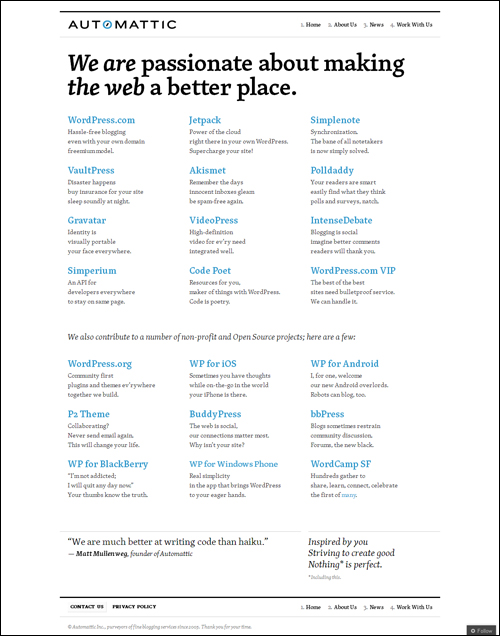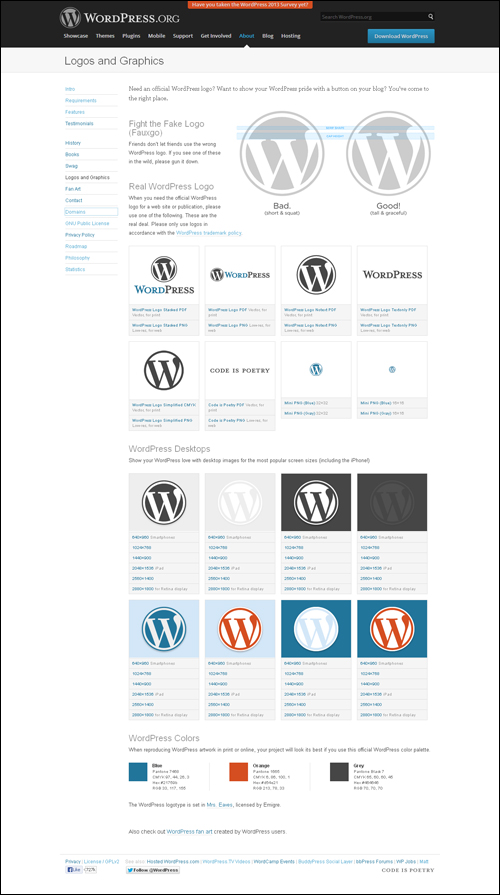Why Is WordPress Free? Uncovering Hidden Catches

In this article, we look at some of the key licensing issues governing the Free use of WordPress and examine whether or not there really are any “hidden” catches.
WordPress – Is There A Hidden Catch?
As we’ve mentioned in other articles, WordPress is 100% free to download and use. WordPress is a free and open source software, licensed under the GNU General Public License agreement …

You can install WordPress on your own domain and do whatever you like with the WordPress code. You can extend or modify WordPress however you choose and use it commercially without licensing fees or restrictions.
We also saw that WordPress is free not just in terms of price, but also in terms of the amount of control you have in using it. For example, you have the freedom to run the program, for any purpose, the freedom to study how the program works, and change it to make it do what you wish, the freedom to redistribute the application, and the freedom to distribute copies of your modified versions to others.
So … is there a “hidden” catch to using WordPress?
How can such a powerful software that is currently used to power millions of websites around the world—including thousands of commercial sites—be made so freely available with no hidden catches?
Let’s begin by asking the most obvious question:
Why Don’t The Creators Of WordPress Sell The Software?
As we have already explained, free open source software allows anyone to view the software’s source code and modify it. When the creators of WordPress decided to make their software available as open source software, a community of software developers began to gather around to find ways to improve it.
Because these modifications and improvements can then be freely distributed to others (who can also, in turn, modify, improve and redistribute the software code to others), WordPress itself began to evolve as its own organism.
Basically, no company or individual actually owns WordPress. WordPress is an open source community project that attracts thousands of talented programmers, who then contribute to its development, report bugs, suggest new features and vote on what the next version’s priorities are.
So … if no one actually owns the software, how does anything get done?
Well, there is a core team of WordPress developers that lead the project development, but essentially anyone can get involved in the WordPress community and begin contributing to improving the software. In fact, active participation and contribution are encouraged by the WordPress community, as this leads to the development of a more secure, robust and feature-rich application that then benefits all users. There are WordPress events like “Word Camps” and local meets all around the world, as well forums, user groups and a whole range of other opportunities made available to WordPress users to meet and exchange ideas.
Contrary to most commercial business models, the philosophy behind the Open Source software movement is that software is not like other tangible products. Once created, software can be copied over and over again with very little cost involved.
A great example that illustrates the argument put forward by the Open Source software movement which is often quoted, is that of a car parts manufacturer. Each car part has a cost to manufacture and a factory that makes car parts needs to take this and other costs, plus a reasonable profit margin into account when calculating the viability of continuing the production of its car parts. Making copies of a software program, however, does not follow the same principles as making tangible products as we’ve just described.
If an entire community participates freely in developing the software, and there is no actual cost to reproduce the software, then why should the price of acquiring a copy of the software not reflect this?
Ok … but there are still some costs, right? I mean, who is paying for the servers and domain names used by the WordPress development team, and how can they afford this if everything is free?
Great question! How can the WordPress team afford to keep things going, and who is paying for the technical costs (e.g. hardware and webhosting).
Matt Mullenweg, the co-founder and of the main developers of WordPress, owns a company called Automattic, which provides a number of blogging services, including many “freemium” services, where the basic service is free but restricted, and paid or “premium” options are available to unlock these restrictions …

One of these services is a free blog hosting service at WordPress.com (not to be confused with WordPress.org, which is where you can download the software to use on your own domain – this is called self-hosting).
WordPress.com is a restricted blog hosting service, where people pay to upgrade and unlock features if required. So, the core developers have the means to sustain the costs, by providing related products and services to their community of users.
As you will see below, this is exactly the approach many open source software companies adopt to make money.
How People Make Money With WordPress
Just because something is open source and free, doesn’t mean that it should be treated differently than proprietary technologies or commercial products. The key strategy behind making the software freely available is “branding”. By itself, branding doesn’t generate any money, but if done correctly, it can lead to greater visibility and a rapid growth and domination of market share. This attracts new users, which can then be converted into buyers of related products and services.
The profitable aspect of making money with any open source software, therefore, is by providing products or services built for and by people who use the same open source software.
WordPress has developed a satellite of product and service providers, all based on helping WordPress users get more benefit out of using the software. There are many successful and highly profitable businesses today that provide a range of excellent products and services catered exclusively to the WordPress market.
Some of these products and services include:
- WordPress Web Development (e.g. WordPress site installation, web design and site management services)
- WordPress Plugin Development
- WordPress Theme Development
- WordPress Web Hosting
- WordPress Training
- WordPress Consulting
- WordPress Support
Many companies and individuals that started out by providing products and services in the above fields have gone on to make sustainable or even multimillion-dollar incomes, and WordPress is still growing considerably.
So … not only can you make money running a successful business built using WordPress, you can also make money running a business that helps other WordPress users. This is no different than other online revolutions, such as internet marketing, online business development, video game, music and app developments.
There are just a few other important points that need to be made regarding WordPress and the implications associated with using the software to develop commercial products and services around it.
WordPress And Copyright – Is WordPress Copyright Free?
To put it quite simply, no.
WordPress is not copyright free. WordPress is licensed under GPL (General Public License), which allows you to use, modify and redistribute the code, but you don’t have copyright to the entire code. You do have copyright over any contributions or modifications you make to the software, but GPL requires that any derivative work you release or distribute should be licensed under GPL as well.
The definition of a derivative work is as follows …
In copyright law, a derivative work is an expressive creation that includes major, copyright-protected elements of an original, previously created first work (the underlying work).
(source: Wikipedia)
This means that while you may have the copyright and the freedom to do anything you like with the code, any work that is a derivative also inherits the GPL license automatically, allowing others the freedom to use, modify, and redistribute your code however they like.
If you need to understand more about GPL and the philosophy behind open source software, see the GNU’s Philosophy.
WordPress And Trademarks
Although WordPress releases its software under GPL, the WordPress Foundation owns a number of registered trademarks, including the words WordPress and the WordPress Logo …

![]()
Note: If you are thinking of starting a WordPress-related product or service, don’t use the word “WordPress” in your domain as this is against their trademark policy covering the use of domain names.
There are other restrictions associated with the use of WordPress trademarks. Read more about the WordPress Trademark Policy.
Hopefully, now you have a better understanding of why WordPress is free, and how its development can continue to thrive and remain sustainable as an open source software.
To learn what costs are involved in using a WordPress-powered site, go here:
For more benefits of using WordPress, read the article below:
For useful WordPress statistics, see the tutorial below:
References:
Most of the material used to create this article has been sourced from the official WordPress site at WordPress.org. For more details, see WordPress Philosophy.

(WordPress image source: Evan Lorne / Shutterstock.com)
***
"I was absolutely amazed at the scope and breadth of these tutorials! The most in-depth training I have ever received on any subject!" - Myke O'Neill, DailyGreenPost.com
***